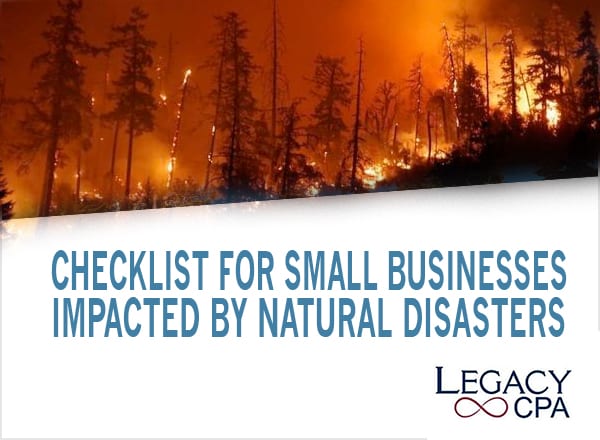September 14, 2020 …
Natural disasters strike when least expected, just like the wild fires we saw this past week. Entire cities wiped out within minutes, businesses lost. It’s painful, unimaginable and just not right.
For small business owners, natural disasters can have serious effects. For one, it’s harder to restore operations because unlike larger businesses, you have less available resources. There is relief, though.
Last Thursday, President Trump approved Disaster Declaration for Oregon. The presidential declaration puts into motion long-term federal recovery programs, some of which are matched by state programs, and designed to help disaster victims, businesses and public entities.
Below, we have compiled a checklist to help you navigate through these trying times. Our hearts are with you. Loss of business, loss of forever homes, all filled with memories – just difficult.
Give it to the Japanese Samurai for this really cool quote, which we hope will set the tone for the rest of the article: “My barn having burned down, I can now see the moon!”
YOU: The Business Owner!
How are you and are you ok?
Running a business is stressful enough, add to the mix getting entangled in mother nature’s wrath. If you haven’t already, this is the time to reach out to family, friends, advisors and or local support groups. Your health, your outlook will dictate the outcome of your operations. You are not alone. We are here for you as well!
Employees
Have a heart to heart with your employees. Be upfront about the impact of the disaster on your business, you will be heartened by their support. To get your business up and running, challenge your workforce with diverse tasks. Times will be tough and you will have to make difficult payroll decisions. Some payroll considerations to keep in mind:
- Nonexempt Employees: The Fair Labor Standards Act (FLSA) requires you to pay nonexempt employees only for hours that the employees have worked. You are not required to pay non-exempt employees if you are unable to provide work for them due to a natural disaster. (Exception to the Rule: nonexempts who receive fixed salaries for fluctuating workweeks. These nonexempt employees have agreed to work an unspecified number of hours for a specified salary. As such, you must pay their full weekly salary for any week in which any work was performed).
- Exempt Employees: You are required to pay the employee’s full salary for the workweek when the business closes for less than a week. You can deduct the employees’ paid leave balance to pay their full weekly wages for the time missed while the business is closed. If the business is closed for a full workweek, you do not need to pay exempt employees for the week that business was closed.
Business Records
Obtain replacement business records if they are lost. These include insurance policies, contracts, employee records. Also, make sure to get your IT system up and running as quickly as you can.
Insurance
- Check your policies for coverage.
- Make a list and document all your losses (take photos of damages).
- Contact your insurance carrier and before accepting proposed payouts, seek a second opinion.
Emergency Relief Programs
On September 10, 2020, President Trump approved Disaster Declaration for Oregon, which puts into motion long-term federal recovery and financial relief programs. The declaration makes it easier to coordinate wildfire response and will bring significant financial assistance to Oregon from the federal government.
Here are some resources to look into:
- FEMA – Federal Emergency Management Agency
- SBA – US Small Business Administration
- Provides low-interest disaster loans to help businesses and homeowners recover from declared disasters.
- Click here to apply for the SBA’s Disaster Loan program
- IRS – Internal Revenue Service
- Provides tax relief in disaster situations
- Click here to read about tax relief guidance for businesses and individuals
- State of Oregon
- Another resourceful site to monitor for grants and resources.
- Click here to get an overview of the state’s disaster assistance programs
- County Websites
- Click here for Jackson County
- Chamber of Commerce
Keep Records
For insurance, government assistance and tax deduction purposes, make sure you keep records for:
- Damaged, lost or destroyed equipment and business buildings.
- Repairs, clean-up costs, temporary storage costs etc.
- Keep in mind: tax deductions apply to repairs, not improvements (there is a difference!)
Do you Operate from Leased Business Premises?
Talk to your landlord on possible rent relief and the time frame for any necessary repairs to be done.
Your Suppliers
- Review purchase agreements to determine rights and obligations of both parties.
- Speak to your suppliers. Will they accept delayed payment terms?
- How quickly can your suppliers re-supply what’s needed to re-start business operations?
Your Customers
- Review sale agreements to determine rights and obligations of both parties.
- Develop and implement a communication strategy that conveys your re-start plans and how you’ll help them as they too recover from the disaster.
- Can customers bring forward payment of any amounts owed to your business?
- Enlist customer support as you re-start business (e.g. sales campaigns).
Business Forecasts
Revise your business cash flow and business forecasts. Be realistic and conservative in your estimates.
- A specialist business turn-around advice may be a sound investment to make.
Taxes
- Work with your accountant to see if any favorable tax adjustments can be made in your next tax return.
- Seek deferred tax payment plans if necessary.
- In serious hardship cases, tax debt waiver – an offer in compromise – may be available.
Loans/Financing
- Quantify any additional financing needed to re-start business operations and explore financing options.
- Engage with existing financiers and discuss your business recovery plans.
- Seek a temporary break on interest repayments if necessary.
Lessons Learned
Here you ask yourself tough questions and answer honestly. It’s not about blame, or being right or wrong … it’s all about the learning should it – God forbid – happen a next time.
- What went well in responding to the disaster?
- What could have been done better?
- Were your business documents digitized and backups kept offsite?
- Did you purchase appropriate coverage for regional disasters?
- Did you put aside enough funds to cover several weeks of expenses?
- Did you have a business continuity plan prepared for the just in case?
Disasters happen. Ultimately, how you respond, your mindset will play a key role in a successful recovery. Keep in mind that you are not alone. For one, we are here for you, to guide and answer any questions you may have. Paulo Coelho said it best in his book The Alchemist: “And, when you want something, all the universe conspires in helping you to achieve it.”
As always, we are on your side. If you have questions, give us a call.
Be safe and fight on!
Team Legacy CPA
(541) 326-0993

